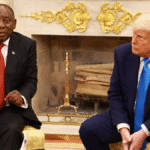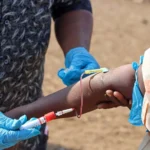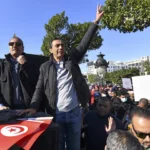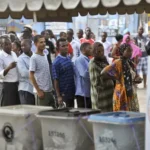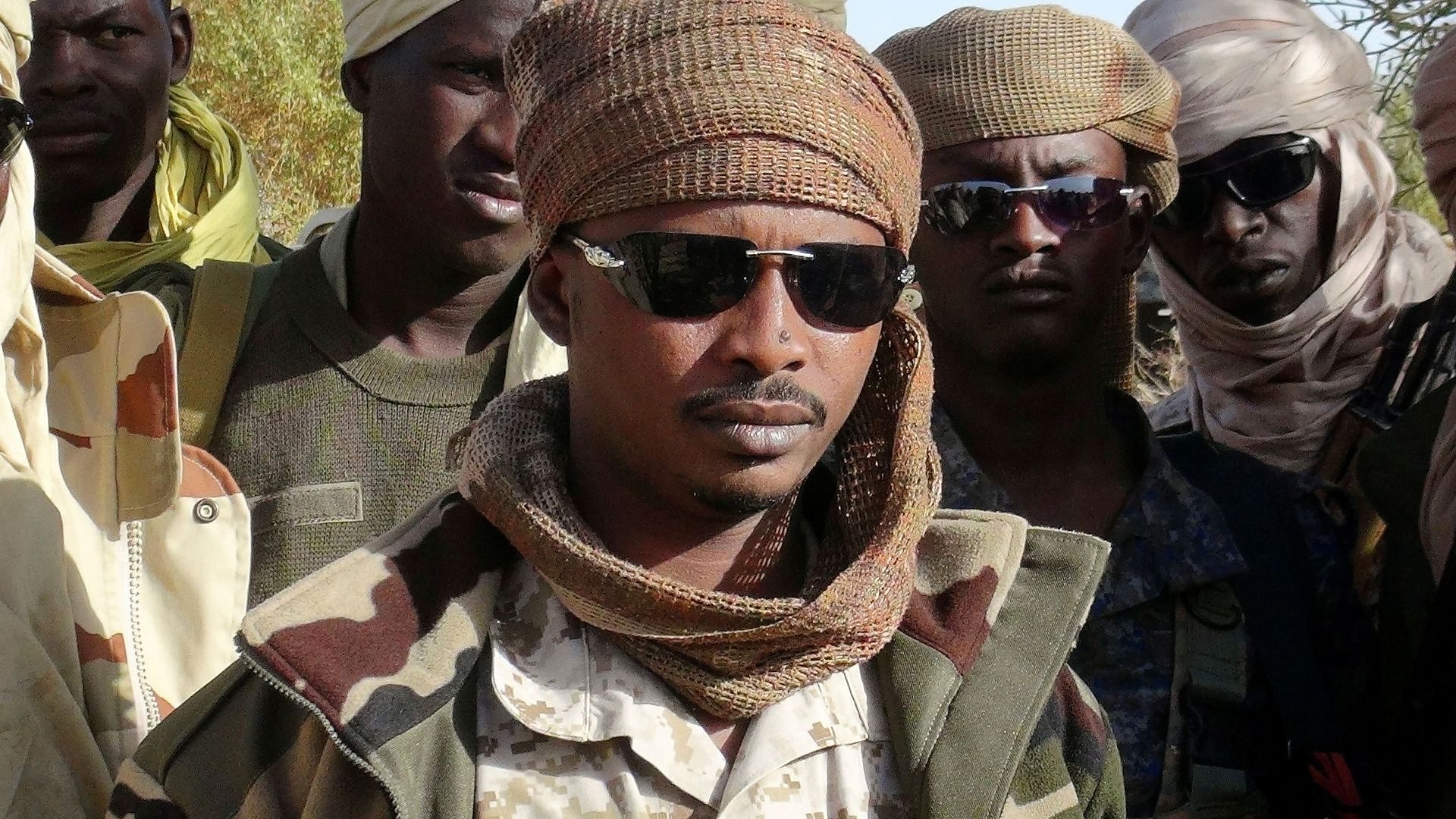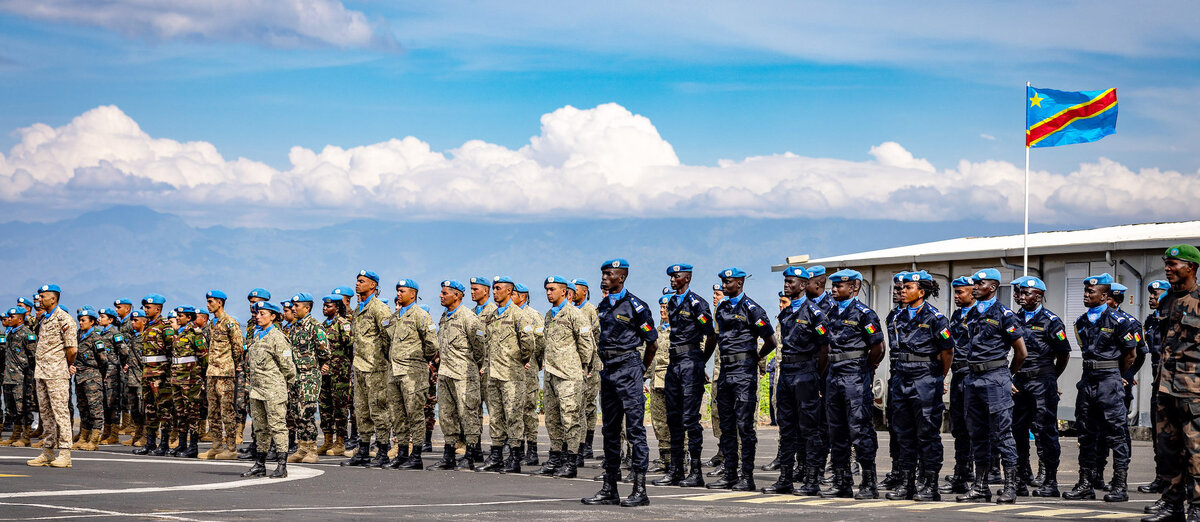The remarkable clicks of African languages: Xhosa and Zulu in focus
Languages serve as windows into the cultures and histories of the people who speak them
Ferry capsizes in DR Congo, 38 dead, over 100 missing
Overloading and poor safety regulations are suspected to be contributing factors.
Over 20 killed in central Mali attacks
The tragic incident highlights the ongoing security challenges faced by Mali, which has been grappling with an insurgency for years.
France redefines Djibouti base as key military hub
French President Emmanuel Macron has emphasized the importance of the French military base in Djibouti, describing it as a key “projection point” for France’s evolving military operations in Africa.
Chad leader elevated to marshal, following father’s footsteps
Chad’s President, General Mahamat Idriss Déby Itno, has been elevated to the rank of Marshal, the highest military title in the country.
Deadly stampede at charity events leaves 13 dead in Nigeria
Two separate crowd crush incidents at charity events have claimed the lives of at least 13 people.
Mayotte families struggle to rebuild after cyclone, cite lack of aid
With the rainy season approaching, families like theirs are increasingly worried about their ability to complete repairs in time, highlighting the urgent need for aid and support
17 Chinese nationals accused of running illegal gold mine in Congo
The Chinese embassy in Kinshasa has yet to comment, while Burundi’s embassy stated it is awaiting further details
Tourism: A billion-dollar boost for Africa’s economy
Tourism continues to play a vital role in Africa’s economic development, contributing billions of dollars
Somalia launches “New Mogadishu” development project
In a historic move for Somalia, President Hassan Sheikh Mohamud officially launched the “New Mogadishu” development initiative on Thursday, aiming to transform the capital’s economic landscape. The initiative includes the construction of a modern airport, a new port, and an economic zone designed to drive growth and attract investment. During the launch, President Mohamud praised the resilience of Somalia’s business community, highlighting their role in providing essential services despite challenging circumstances. “Somali businessmen have proven their commitment to the nation’s progress,” he said. The initiative is also expected to create thousands of jobs, with Mohamud emphasizing that it’s not just about infrastructure, but about creating opportunities for the youth and uplifting local communities. “This project marks a significant milestone for Somalia as we work to revitalize the capital and build investor confidence, paving the way for a brighter economic future,” Mohamud added. Fardowsa Osman Egal, Somalia’s Minister of Transport and Aviation, spoke about the new airport’s importance, noting that it would alleviate the limitations of the current Mogadishu airport. “This new international airport will help increase international flights, supporting the creation of a financial zone to attract both local and international investors.” Valued at around $650 million, the New Mogadishu project is poised to significantly boost Somalia’s economy. On behalf of the business community, Mohamud Abdikarim Gabeyre, chairman of the Somali Chamber of Commerce and Industry, welcomed the project, expressing hope that local businesses would benefit from the new investment. In addition to the New Mogadishu initiative, President Mohamud also inaugurated the $400 million Gateway Complex project on Wednesday. This ambitious development includes Somalia’s first five-star hotel, an international convention center, a modern hospital, premium hotel apartments, and a shopping complex, aiming to transform Mogadishu’s skyline. Despite ongoing security challenges, including threats from the al-Shabab terrorist group, the launch of these projects marks a major step toward rebuilding Somalia’s infrastructure and economy.
Two witchdoctors arrested for plotting against Zambian president
Two suspected witchdoctors were apprehended in Lusaka, Zambia’s capital, Friday for allegedly attempting to “bewitch” President Hakainde Hichilema, police said. Police spokesman Rae Hamoonga said in a statement the suspects had been formally arrested and charged with professing knowledge of witchcraft, possession of charms, and cruelty to wild animals. “The suspects, identified as Jasten Mabulesse Candunde, 42, and Leonard Phiri, 43, were found in possession of assorted charms, including a live chameleon and are alleged to be practicing witchdoctors,” Hamoonga said, adding that preliminary investigations revealed that the duo was engaged by Nelson Banda, the younger brother of Emmanuel, a former independent member of parliament, to use the charms to harm Hichilema. He said Nelson Banda was currently on the run. Police said the suspects disclosed that they were promised a payment of 2 million Zambian Kwacha (over $7,000) after the execution of their mission.
Mpox and Marburg outbreaks strain Africa’s health systems
Central and East Africa are facing severe health crises as Mpox and the Marburg virus continue to spread, overwhelming healthcare systems. The Democratic Republic of Congo (DRC) remains at the epicenter of the Mpox outbreak, with over 13,000 cases and 450 deaths reported, underscoring the urgency of the situation. Neighboring countries like Cameroon, Burundi, and Uganda are also experiencing new cases. Despite efforts to contain the virus, limited testing capacity and strained healthcare infrastructure have made it difficult to control the spread. In August 2024, the World Health Organization (WHO) declared Mpox a public health emergency due to the escalating number of cases, operational challenges, and the need for coordinated global action. “Mpox has been a recurring issue in the DRC for over a decade, with cases steadily rising each year. This year, the number of cases has already surpassed last year’s total, with over 14,000 cases and 524 deaths,” said WHO Director-General Tedros Adhanom Ghebreyesus. Mpox symptoms include fever, swollen lymph nodes, and a rash that typically begins on the face before spreading. Though often mild, the disease can lead to severe complications, particularly for individuals with weakened immune systems. The virus spreads through close contact with infected individuals or animals, which poses particular challenges in densely populated regions. “A person is infectious from the onset of symptoms until the skin lesions crust over and new skin forms. Transmission primarily occurs through respiratory droplets or direct contact with bodily fluids, lesions, or contaminated items,” explained Dr. Olivia Kasirye, Public Health Officer for Sacramento County. Compounding the health crisis, Rwanda is dealing with its first outbreak of the Marburg virus, with over 60 confirmed cases, including several healthcare workers. The virus’s high fatality rate has increased the urgency for an immediate and coordinated response from national and international health organizations. Insufficient Vaccines and Global Support Needed Nearly 900,000 Mpox vaccine doses have been distributed across Africa, but experts warn this is far from sufficient. The Africa CDC estimates that more than 10 million doses are necessary to control the outbreak. Vaccination efforts are ongoing with support from global partners, but substantial challenges remain. As Africa battles both Mpox and Marburg, the call for increased investment in testing, surveillance, and healthcare infrastructure is more urgent than ever. While local communities are working tirelessly on the ground, sustained global support is critical to addressing these overlapping health crises.
Families struggle to survive amidst South Sudan floods
Floods have become a yearly occurrence in South Sudan, forcing thousands of people to flee their homes.
Security council renews mandate for UN mission in DRC
The United Nations Security Council has voted to extend the mandate of the UN peacekeeping mission in the Democratic Republic of Congo (DRC) for another year.
Niger accuses Nigeria of destabilization efforts
Niger has summoned the Nigerian charge d’affaires, accusing Nigeria of “serving as a rear base” to destabilize the country.
Over 80,000 Sudanese flee to South Sudan as conflict intensifies
The UNHCR warns of a deepening humanitarian crisis, with limited resources and a surge in arrivals overwhelming border services.
Sudan’s RSF hints at establishment of new gov’t against Burhan
Rapid Support Forces (RSF) in Sudan have declared plans to work with a new civilian-led government in territories they control, raising concerns about a potential partition of the country.
WFP condemns killing of three staff in Sudan airstrike
The World Food Programme (WFP) has confirmed the deaths of three of its staff members in an aerial bombardment in Sudan.
Cyclone Chido death toll in Mozambique hits 73
Disaster management agency appeals for global support to establish exact number of fatalities
Cyclone-hit Mayotte residents confront Macron, demand urgent aid
Macron extended his trip to assess the aftermath of the storm, the worst to hit Mayotte in 90 years
Morocco’s goat cheese: A taste of tradition
Morocco is home to a centuries-old culinary treasure: traditional goat cheese
Benin grants citizenship to descendants of slaves
When Nadege Anelka first arrived in Benin from her home island of Martinique, a French overseas territory in the Caribbean, the 57-year-old travel agent experienced a profound sense of déjà vu. “A lot of the people reminded me of my grandparents — the way they wore their headscarves, their mannerisms, their mentality,” she said. Feeling an immediate connection to the country, Anelka decided to settle in Benin last July and open a travel agency. She now hopes to become a citizen under a new law passed in September, which grants citizenship to individuals who can trace their lineage to the transatlantic slave trade. The law, introduced by President Patrice Talon, is part of a larger effort by Benin to come to terms with its historical role in the slave trade. It allows those over 18 who do not already hold another African nationality to apply for citizenship by providing proof that an ancestor was forcibly taken from sub-Saharan Africa during the slave trade. DNA tests, family records, and testimonies are accepted as proof. Anelka used a website called “Anchoukaj” (“Affiliation” in Antillean Creole), recognized by Benin, to trace her family’s history and confirm that her ancestors were slaves in Martinique. If her application is successful, she will receive a provisional certificate of nationality, valid for three years, during which she must spend at least one year in Benin to obtain full citizenship. Benin is not the first country to offer citizenship to descendants of slaves. Earlier this month, Ghana naturalized 524 African Americans, inviting them to “come home” as part of a commemoration of the 400th anniversary of the arrival of the first enslaved Africans in North America. However, Benin’s law holds particular significance due to the country’s central role in the slave trade. European merchants deported an estimated 1.5 million slaves from the Bight of Benin — an area covering modern-day Benin, Togo, and parts of Nigeria. The town of Ouidah was one of the busiest slave-trading ports in Africa during the 18th and 19th centuries, where nearly a million enslaved individuals were shipped out, primarily to the United States, Brazil, and the Caribbean. Benin has faced difficulty addressing its complicity in the slave trade, as local kings captured and sold slaves to European merchants for over 200 years. The remnants of these kingdoms still exist today in the form of tribal networks, alongside the groups who were raided. Rumors that President Talon may be a descendant of slave merchants sparked controversy during his 2016 presidential campaign, though he has never commented on the matter. In contrast to many other African countries that participated in the slave trade, Benin has openly acknowledged its history. In the 1990s, the country hosted a UNESCO-sponsored international conference examining the sale of slaves. In 1999, President Mathieu Kérékou publicly apologized to African Americans for Africa’s role in the trade, even kneeling during a visit to a church in Baltimore. Alongside this national reckoning, Benin has also embraced “memorial tourism” as a way to attract visitors and address its legacy. Many memorial sites are located in Ouidah, including the “Door of No Return,” which marks the point where many enslaved people were shipped across the Atlantic. There is also the “Tree of Forgetfulness,” where enslaved individuals were symbolically made to forget their past lives before boarding the ships. “Memories of the slave trade are present on both sides of the Atlantic, but only one of these sides is well known,” said Sindé Cheketé, head of Benin’s state-run tourism agency. Nate Debos, a 37-year-old American musician from New Orleans, learned about Benin’s citizenship law while attending the Porto Novo mask festival. Though he had never visited West Africa, his interest in Vodun, the religion practiced by millions in Benin, brought him to the country. Debos, president of the New Orleans National Vodou Day association, said the Vodun Day festival on January 10 in Ouidah mirrors the celebrations in New Orleans. Vodun, which originated in the Kingdom of Dahomey (now southern Benin), revolves around the worship of spirits and ancestors. During slavery, Vodun evolved into Vodou in the Americas and the Caribbean, blending with Catholicism. “Vodou is one of the chains that connects Africa to the Americas,” said Ana Lucia Araujo, a professor of history at Howard University. “For enslaved Africans, it was a way of resisting slavery.” Debos emphasized that Vodun was a sophisticated, noble spiritual practice that European colonizers and slave owners sought to suppress. “Our African ancestors were not tribal savages,” he said. “They had beautiful spiritual traditions.” Debos now plans to apply for citizenship, but he does not intend to move to Benin permanently. “At the end of the day, I am an American, even when I’m dressed in the wonderful fabrics and suits they have in Benin,” he said. For Anelka, her decision to pursue Beninese citizenship is more symbolic. “I know I will never be completely Beninese,” she said. “I will always be considered a foreigner. But I’m doing this for my ancestors. It’s a way to reclaim my heritage, a form of reparation.”
Mauritania, EU sign €100M agreement to combat irregular migration
Mauritania and the European Union signed a €100 million ($103.6 million) agreement Thursday aimed at promoting development and combating irregular migration. The agreement was signed during a meeting in the capital Nouakchott between Mauritanian Minister of Economy and Finance Sidi Ahmed Ould Abouh and European Commissioner for International Partnerships Jozef Sikela, according to the Mauritanian News Agency. Ould Abouh said the funds will be allocated to support development, enhance social cohesion and stability, boost economic growth, improve health care and address the root causes of migration. He emphasized that the agreement also aims to strengthen the capacity of institutions combating irregular migration while protecting the fundamental rights of refugees and migrants. “This direct budget support reflects the confidence the international community has in our national mechanisms,” he added. Sikela noted that the funding will prioritize the development of green hydrogen as a driver of economic growth and job creation. He highlighted its potential to open new opportunities for Mauritania and European investors. “This funding demonstrates the EU’s swift commitment to fulfilling its promises to Mauritania,” he added. The EU’s interest in Mauritania has grown recently, particularly as relations between Western nations and several Sahel countries have become strained. Mauritania serves as a key transit point for African migrants, with the northern city of Nouadhibou becoming a hub for those seeking to cross into Europe in recent years. The country has established agreements with several European nations, notably Spain, to curb irregular migration.
Egyptian, Iranian presidents discuss regional developments
At least 10 Palestinians were killed and three injured, two critically, in an Israeli attack on the Al-Shati refugee camp in western Gaza City, health sources said Friday. Israeli forces targeted a group of Palestinians who were waiting in line for water at the camp, the sources said. The strike adds to the mounting toll from Israeli attacks on Gaza since Oct. 7 last year. Israel has systematically targeted civilian facilities including schools, hospitals and places of worship in its offensive on Gaza, repeatedly claiming, often without evidence, that they were striking targets belonging to the Palestinian group Hamas. Under the rules of war, targeting civilian facilities can constitute a war crime. Israel’s war on Gaza has led to the deaths of more than 45,100 people following a cross-border attack on Israel by Hamas on Oct. 7, 2023. The UN estimates that 70% of the dead in Gaza have been women and children. Around 1,200 people were killed in the Hamas attack, and 250 were taken to Gaza as hostages. Roughly 100 remain. The International Criminal Court issued arrest warrants last month for Israeli Prime Minister Benjamin Netanyahu and his former Defense Minister Yoav Gallant for war crimes and crimes against humanity in Gaza. Israel also faces a genocide case at the International Court of Justice for its war on Gaza.
Morocco mediates release of French nationals from Burkina Faso
Four French nationals detained in Burkina Faso for a year have been released following successful mediation efforts by Morocco.
Libya warns of foreign interference as Russia transfers weapons
Libyan Prime Minister Abdulhamid Dbeibah has expressed concern over reports of Russia transferring military equipment to eastern Libya.
Kenya declares gender violence a top threat
The government has formed a specialized unit to combat femicide and is implementing new measures to address this pressing issue.


